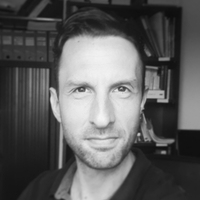
Frederic Armao
Fáilte/Welcome/Bienvenue!
I am currently an Associate Professor at the University of Toulon (France).
My research focuses on European history, more specifically Irish/British folklore and popular culture in relation with Celtic mythology. I am particularly interested in Irish feasts and celebrations, especially the case of the four ancient Irish festivals (Samhain, Imbolc, Bealtaine and Lughnasa).
I hold a PhD in Irish History from the University of Lille, a Master’s Degree in Irish Studies from the University of Paris Sorbonne-Nouvelle, and am a holder of the agrégation of English (major: history of the Anglophone world).
I have had the opportunity to publish and/or present my papers in a number of countries, including France, Belgium, Ireland, UK, Spain, Canada (Alberta & Quebec), USA, Sweden, Romania and Poland.
Currently, I teach English (ESP & Literary Translation) as well as Irish and British history at both undergraduate and graduate level.
Please feel free to contact me for any question or research project.
I am currently an Associate Professor at the University of Toulon (France).
My research focuses on European history, more specifically Irish/British folklore and popular culture in relation with Celtic mythology. I am particularly interested in Irish feasts and celebrations, especially the case of the four ancient Irish festivals (Samhain, Imbolc, Bealtaine and Lughnasa).
I hold a PhD in Irish History from the University of Lille, a Master’s Degree in Irish Studies from the University of Paris Sorbonne-Nouvelle, and am a holder of the agrégation of English (major: history of the Anglophone world).
I have had the opportunity to publish and/or present my papers in a number of countries, including France, Belgium, Ireland, UK, Spain, Canada (Alberta & Quebec), USA, Sweden, Romania and Poland.
Currently, I teach English (ESP & Literary Translation) as well as Irish and British history at both undergraduate and graduate level.
Please feel free to contact me for any question or research project.
less
InterestsView All (18)
Uploads
Articles by Frederic Armao
Keywords: Celtic festivals, Irish festivals, folklore, mythology, science, Yeats, Friel
Le présent article analyse l’utilisation faite au cours du XXe siècle de la mythologie irlandaise et plus particulièrement du cas des fêtes dites « celtiques » par deux auteurs irlandais, William Butler Yeats et Brian Friel. Cette utilisation, que l’on pourrait imaginer au premier abord dictée par des raisons purement artistiques, se révèle plus profonde et symptomatique de la culture irlandaise, cette Irishness, souvent étroitement liée à des valeurs politiques et/ou religieuses. La thématique de la « science » et son impact sur la culture et les mœurs de l’Irlande moderne sera un élément qui permettra d’enrichir notre étude, la problématique ayant été abordée directement par les deux auteurs en complément, et parfois en opposition, à la « tradition » irlandaise.
Mots-clefs : fêtes celtiques, fêtes irlandaises, folklore, mythologie, science, Yeats, Friel
Le pèlerinage de Cathair Crobh Dearg, méconnu du grand public, existe pourtant depuis des siècles, sinon des millénaires : nous tentons d'analyser la « récupération » contemporaine de la célébration par le clergé local et essayons de comprendre si la christianisation du site est le fruit de l'opposition au paganisme ou, plus singulièrement, représente une résistance catholique face au protestantisme.
Beltaine, fêtes celtiques, feu, Bel, Túatha Dé Dánann, Pâques, controverse pascale, Muirchú, saint Patrick
This article argues that some of the Irish monks attempted to assimilate Beltaine to Easter. We will go through the Irish Annals as well as the Lebor Gabála Erenn and the hagiographies of Muirchú and Tirechán and see that these works are at variance with the most popular theory –that is Samain stands for the “Easter of the pagans”.
Beltaine, Celtic festivals, fire, Bel, Túatha Dé Dánann, Easter, paschal controversy, Muirchú, saint Patrick
Conference programmes/Calls for papers etc by Frederic Armao
Teaching Documents by Frederic Armao
Papers by Frederic Armao
Keywords: Celtic festivals, Irish festivals, folklore, mythology, science, Yeats, Friel
Le présent article analyse l’utilisation faite au cours du XXe siècle de la mythologie irlandaise et plus particulièrement du cas des fêtes dites « celtiques » par deux auteurs irlandais, William Butler Yeats et Brian Friel. Cette utilisation, que l’on pourrait imaginer au premier abord dictée par des raisons purement artistiques, se révèle plus profonde et symptomatique de la culture irlandaise, cette Irishness, souvent étroitement liée à des valeurs politiques et/ou religieuses. La thématique de la « science » et son impact sur la culture et les mœurs de l’Irlande moderne sera un élément qui permettra d’enrichir notre étude, la problématique ayant été abordée directement par les deux auteurs en complément, et parfois en opposition, à la « tradition » irlandaise.
Mots-clefs : fêtes celtiques, fêtes irlandaises, folklore, mythologie, science, Yeats, Friel
Le pèlerinage de Cathair Crobh Dearg, méconnu du grand public, existe pourtant depuis des siècles, sinon des millénaires : nous tentons d'analyser la « récupération » contemporaine de la célébration par le clergé local et essayons de comprendre si la christianisation du site est le fruit de l'opposition au paganisme ou, plus singulièrement, représente une résistance catholique face au protestantisme.
Beltaine, fêtes celtiques, feu, Bel, Túatha Dé Dánann, Pâques, controverse pascale, Muirchú, saint Patrick
This article argues that some of the Irish monks attempted to assimilate Beltaine to Easter. We will go through the Irish Annals as well as the Lebor Gabála Erenn and the hagiographies of Muirchú and Tirechán and see that these works are at variance with the most popular theory –that is Samain stands for the “Easter of the pagans”.
Beltaine, Celtic festivals, fire, Bel, Túatha Dé Dánann, Easter, paschal controversy, Muirchú, saint Patrick